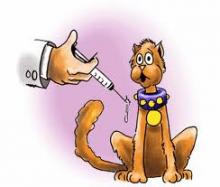I recently noticed my youngest cat becoming more aggressive. She started to hiss at my older cat and to do unusual things like jump on doors and slide down with her claws. I thought about calling the vet and then remembered I never had the distemper vaccine administered to her. I had always heard that the distemper shot helped to calm them. I decided to research the vaccine and realized it has nothing to do with temperament. Distemper is a viral disease passed between felines through contact, usually saliva, and it is usually fatal. Although outdoor cats are at highest risk, humans can also pass the virus to indoor cats with contaminated clothing or by touching an infected cat.
The distemper is a widely used vaccine. It is highly effective and can often be given every three years, instead of annually. Possible side effects include lethargy, loss of appetite, fever, sneezing and watery discharge from the eyes. A very serious side effect – the vet should be called immediately - is anaphylactic shock, which includes, difficult breathing, panicked behavior and facial swelling. For this reason, you should watch your cat closely for the first day or two after the vaccine is given. I have heard of cases where the vaccine resulted in renal failure, frequent visits to the vet due to high fever and long recovery times. However, most cats recover quickly from any negative effects. The vaccine should only be given to healthy cats; sick cats may not have strong immune systems and may have further complications.
While some argue that Distemper is uncommon and, therefore, pets need not be vaccinated. It is important to consult with a veterinarian about recommended and required vaccinations. Each state has different requirements and the local vets should have the most recent information regarding outbreaks of disease.
